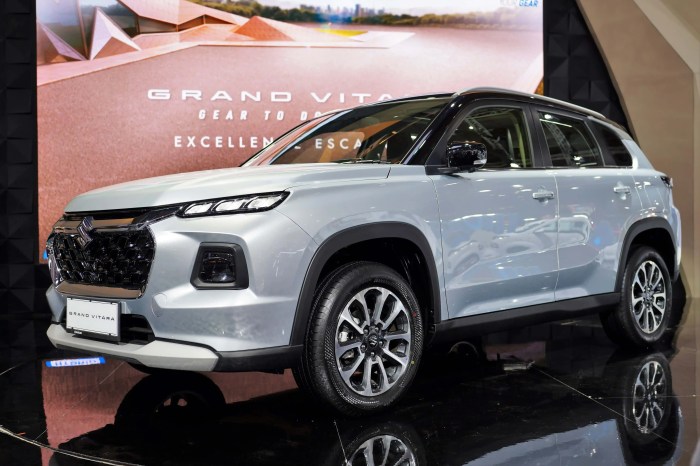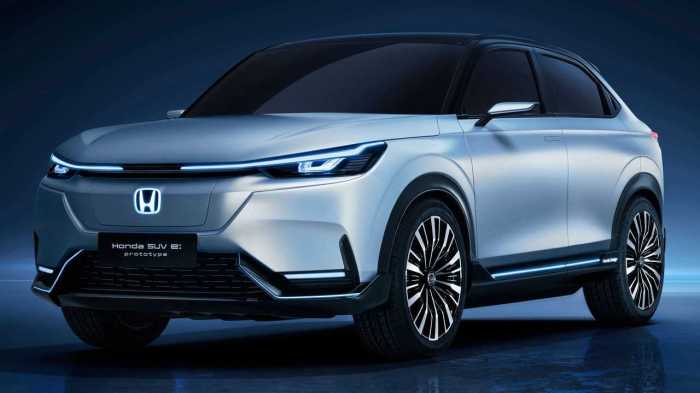When it comes to EV SUVs, we’re diving into a world of cutting-edge technology and eco-friendly transportation. From revolutionizing traditional SUVs to exploring the latest models on the market, this topic is a blend of innovation and environmental consciousness.
Let’s explore the electrifying realm of EV SUVs and uncover why they’re paving the way for a greener future.
Overview of EV SUVs

An Electric Vehicle (EV) SUV is a type of sport utility vehicle powered entirely by electricity. These vehicles use electric motors and batteries instead of traditional internal combustion engines.
Owning an EV SUV comes with various benefits, including:
- Environmental impact: EV SUVs produce zero tailpipe emissions, reducing air pollution and greenhouse gas emissions.
- Lower operating costs: Charging an EV SUV is usually cheaper than filling up a gas tank, resulting in long-term savings for the owner.
- Performance and efficiency: Electric motors provide instant torque, resulting in quick acceleration and a smooth driving experience. EV SUVs are also more efficient than traditional SUVs in terms of energy usage.
- Reduced maintenance: EVs have fewer moving parts than traditional vehicles, leading to lower maintenance costs and fewer visits to the mechanic.
Differences between traditional SUVs and EV SUVs
When comparing traditional SUVs to EV SUVs, some key differences include:
| Aspect | Traditional SUVs | EV SUVs |
|---|---|---|
| Power source | Internal combustion engine | Electric motor and battery |
| Environmental impact | Higher emissions | Zero emissions |
| Operating costs | Higher fuel costs | Lower charging costs |
| Performance | Slower acceleration | Instant torque for quick acceleration |
| Maintenance | More moving parts, higher maintenance costs | Fewer moving parts, lower maintenance costs |
Popular EV SUV Models

EV SUVs have gained popularity in recent years due to their eco-friendly nature and innovative features. Let’s explore some of the most popular models available on the market.
Tesla Model Y
The Tesla Model Y is a top contender in the EV SUV market, offering impressive performance and range. It boasts a range of up to 326 miles on a single charge and can accelerate from 0 to 60 mph in just 4.8 seconds. The Model Y comes equipped with advanced features such as Autopilot, a panoramic glass roof, and a spacious interior.
Pricing for the Tesla Model Y starts at around $50,000.
Audi e-tron
The Audi e-tron is another popular choice among EV SUV enthusiasts. It offers a range of up to 222 miles and delivers a smooth and quiet ride. The e-tron comes with luxurious features like a virtual cockpit, Bang & Olufsen sound system, and adaptive air suspension. Pricing for the Audi e-tron starts at approximately $65,900.
Jaguar I-PACE
The Jaguar I-PACE is a stylish and high-performing EV SUV with a range of up to 234 miles. It accelerates from 0 to 60 mph in just 4.5 seconds, making it a fun and exciting drive. The I-PACE features a modern interior with premium materials, dual touchscreens, and a Meridian sound system. Pricing for the Jaguar I-PACE starts at around $69,850.
Ford Mustang Mach-E
The Ford Mustang Mach-E is a sporty and versatile EV SUV with a range of up to 305 miles. It offers multiple powertrain options, including a GT model that can accelerate from 0 to 60 mph in just 3.5 seconds. The Mach-E features a modern and tech-savvy interior with a large touchscreen display, Ford Co-Pilot360 driver-assist technology, and a Bang & Olufsen sound system.
Pricing for the Ford Mustang Mach-E starts at approximately $43,895.
Charging Infrastructure for EV SUVs
Having a robust charging infrastructure is crucial for EV SUV owners to ensure they can conveniently charge their vehicles and alleviate range anxiety.
Types of Charging Stations
There are three main types of charging stations available for EV SUVs:
- Level 1 Charging: This is the slowest charging option, typically using a standard household outlet. It is convenient for overnight charging but might not be practical for daily use due to the long charging times.
- Level 2 Charging: These stations are faster than Level 1 chargers and are commonly found in public locations, workplaces, and homes. They provide a good balance between charging speed and convenience.
- DC Fast Charging: DC fast chargers are the quickest option, capable of charging an EV SUV to 80% in around 30 minutes. These stations are usually located along highways or in commercial areas for quick top-ups during long journeys.
Charging Speeds
The charging speeds of various charging options can vary significantly:
| Charging Type | Average Charging Speed |
|---|---|
| Level 1 Charging | 2-5 miles of range per hour |
| Level 2 Charging | 10-60 miles of range per hour |
| DC Fast Charging | 60-80 miles of range in 20-30 minutes |
Environmental Impact of EV SUVs
Electric SUVs (EV SUVs) offer a range of environmental benefits compared to traditional gas-powered SUVs. By analyzing the environmental impact of EV SUVs, we can understand their contribution to sustainability and reduction of carbon footprint.
Reduced Emissions
Electric SUVs produce zero tailpipe emissions, reducing harmful pollutants released into the atmosphere. This helps improve air quality and reduce the overall carbon footprint of transportation.
Energy Efficiency
EV SUVs are more energy-efficient than traditional SUVs, utilizing electricity as a cleaner and more sustainable energy source. This efficiency contributes to a decrease in overall energy consumption and reliance on fossil fuels.
Renewable Energy Integration
The use of EV SUVs encourages the integration of renewable energy sources, such as solar and wind power, into the grid. This shift towards cleaner energy production further enhances the environmental sustainability of electric vehicles.
Lifecycle Emissions
While EV SUVs may have higher emissions during the manufacturing process due to battery production, their lower operational emissions over the vehicle’s lifespan offset this initial impact. As battery technology improves and production becomes more sustainable, the overall lifecycle emissions of EV SUVs continue to decrease.
Sustainable Materials
Many EV SUV manufacturers are incorporating sustainable materials into their vehicle designs, further reducing the environmental impact of production. This focus on sustainability extends beyond the vehicle’s operation to its entire lifecycle.
Conclusion
In conclusion, EV SUVs are not just vehicles; they represent a shift towards sustainable mobility and a cleaner planet. As we delve into the world of EV SUVs, it’s evident that the future of driving is electric and environmentally conscious.